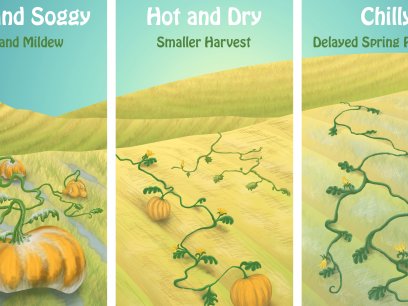
The National Environmental Education Foundation (NEEF) provides objective, science-based information and uses the best available science to inform its work. This article, published on September 15, 2015, by Morris A. (Bud) Ward, reflects peer-reviewed research and government guidance available at the time of publication. Some original source links are no longer active due to changes in agency publishing practices; these changes do not affect the accuracy of the cited material at the time it was written.
- The Scientific Process, Uncertainty and Scientific Consensus
- Common Questions about Climate Change and Resources for Learning More
The Scientific Process, Uncertainty and Scientific Consensus
NEEF understands that:
Science is a process. The scientific method – forming hypotheses, testing them through observations and experiments, analyzing data, and drawing conclusions – allows scientists to better understand the natural world. Scientists rely on each other to question, test, and improve their work, and scientific hypotheses must stand up to rigorous review and replication to be considered proven. Communicating Climate Change: An Essential Resource for Journalists, Scientists and Educators sums it up:
… a theory represents a hypothesis or group of hypotheses that have been confirmed through repeated experiments. After sufficient testing, hypotheses rise to the status of theories, which have come to be accepted by the scientific community. Theories about gravity, evolution, and relativity underpin our understanding of the universe, and help us to understand new phenomena.i
Uncertainty is part of science. Scientists rely on each other to question and improve their work through peer review, further investigation, and replication. Asking questions and challenging conclusions is a critical part of the scientific process. As the American Meteorological Society explains, “because of the skeptical nature of scientists, new ideas are accepted very slowly and only after a great deal of scrutiny. In fact, what authority science achieves is based on the openness by which scientific results are presented for review, evaluation, and additional testing.”ii
Scientific consensus is based on the evidence. A scientific consensus emerges over time, as the evidence becomes consistent and increasingly compelling. Climate Science Investigations (CSI), an interactive series of modules and teaching resources developed by Florida Atlantic University and University of Miami, explains:
When the work being reviewed can be repeated and confirmed, then the scientific community is likely to reach consensus (agreement) and accept the findings and explanations as valid. If, on the other hand, scientists cannot confirm or validate the research, then those explanations or ideas are likely to be challenged, or even rejected. Challenges may also include proposing alternative hypotheses or explanations. The author–scientist may then test these new alternative hypotheses, or he or she may supply additional evidence to support his or her claims. The final goal of the process, however, is not to disagree but to revise the explanation so that the scientific community can reach a shared agreement (consensus).
Once papers are presented at conferences or are published, the wider scientific community has an opportunity to review and challenge the research. The scientific ideas are evaluated against alternative explanations and the evidence is compared with competing evidence collected by other scientists. Acceptance of an explanation ultimately depends on which explanation describes the most observations in the simplest, most logical manner.iii
Common Questions about Climate Change
- What is the scientific consensus on climate change?
- What do leading scientific organizations say?
- What is NEEF’s position on climate change?
- What can I do about climate change?
- Where can I learn more about climate change science?
What is the scientific consensus on climate change?
Based on the evidence, more than 97% of climate scientists have concluded human-caused (anthropogenic) climate change is happening.iv
A scientific consensus that human-caused climate change is happening does not mean that there are no uncertainties about climate change and its impacts. The University Corporation for Atmospheric Research (UCAR) explains that “spirited debate around remaining uncertainties in climate science is a healthy indicator that the scientific method is alive and well.” However, UCAR further notes that “the fundamental elements of climate change are not in dispute” – these fundamentals include how greenhouse gases trap heat, how much carbon dioxide (CO2) humans have added to the atmosphere since the Industrial Revolution, and how climate change is presently affecting plants, animals, ecosystems and people.v
What do leading scientific organizations say?
Statements from leading scientific societies, academies, government agencies, and intergovernmental bodies reflect the scientific consensus on climate change. These statements include:
- US Global Change Research Program (USGCRP, 13 U.S. Government Departments and Agencies) (2014)
“Evidence for climate change abounds, from the top of the atmosphere to the depths of the oceans. Scientists and engineers from around the world have meticulously collected this evidence, using satellites and networks of weather balloons, thermometers, buoys, and other observing systems. Evidence of climate change is also visible in the observed and measured changes in location and behavior of species and functioning of ecosystems. Taken together, this evidence tells an unambiguous story: the planet is warming, and over the last half century, this warming has been driven primarily by human activity.”
“Multiple lines of independent evidence confirm that human activities are the primary cause of global warming of the past 50 years.”
- American Geophysical Union (AGU) (Adopted 2003, revised and reaffirmed 2007, 2012, 2013)
“Humanity is the major influence on the global climate change observed over the past 50 years. Rapid societal responses can significantly lessen negative outcomes.”
- American Medical Association (AMA) (2013)
“Our AMA supports the findings of the Intergovernmental Panel on Climate Change’s fourth assessment report and concurs with the scientific consensus that the Earth is undergoing adverse global climate change and that anthropogenic contributions are significant.”
- Intergovernmental Panel on Climate Change (IPCC) – Fifth Assessment Report (IR5) (2013)
“Warming of the climate system is unequivocal, and since the 1950s, many of the observed changes are unprecedented over decades to millennia. The atmosphere and ocean have warmed, the amounts of snow and ice have diminished, sea level has risen, and the concentrations of greenhouse gases have increased.”
“Human influence on the climate system is clear. This is evident from the increasing greenhouse gas concentrations in the atmosphere, positive radiative forcing, observed warming, and understanding of the climate system.”
- American Meteorological Society (AMS) (2012)
“It is clear from extensive scientific evidence that the dominant cause of the rapid change in climate of the past half century is human-induced increases in the amount of atmospheric greenhouse gases, including carbon dioxide (CO2), chlorofluorocarbons, methane, and nitrous oxide.”
- American Association for the Advancement of Science (AAAS) (2006)
“The scientific evidence is clear: global climate change caused by human activities is occurring now, and it is a growing threat to society.”
- US National Academy of Sciences (NAS) (2005)
“The scientific understanding of climate change is now sufficiently clear to justify taking steps to reduce the amount of greenhouse gases in the atmosphere.”
What is NEEF’s position on climate change?
At NEEF, we hold ourselves accountable for providing objective, science-based information. We accept the scientific consensus that based on the evidence, more than 97% of climate scientists have concluded human-caused (anthropogenic) climate change is happening. Repeated analyses have shown that an overwhelming majority of scientists in the field have concluded that Earth’s atmosphere has warmed markedly over the past six decades and that human activities are responsible for a substantial part of that warming.
NEEF is not an advocacy organization. We do not endorse or advocate any particular policy or legislation related to climate change.
What can I do about climate change?
- Learn. Look at the evidence and turn to resources you trust to learn more about climate change science and the impacts of climate change where you live. You may find the list of resources below helpful in getting started.
- Look for opportunities to contribute to scientific research that will help us document and learn more about the impacts of climate change on our communities and our environment. Citizen science programs are a good place to start.
- Calculate your carbon footprint. EPA’s Household Carbon Footprint Calculator will give you a “ballpark” estimate of your greenhouse gas emissions and help you explore how certain actions can help you reduce your emissions. Answering a few questions in the Center for Climate and Energy Solutions’ What’s My Carbon Footprint? tool will also provide information and tips.
Where can I learn more about climate change science?
The following resources provide science-based information about climate change and its impacts.
Videos and Interactive Websites
Earth: The Operators’ Manual videos
COSMOS: A Spacetime Odyssey videos
- Full Episode: The World Set Free
- How Do We Know We are the Problem?
- Weather vs. Climate Change
- The Diary in the Snow
Climate Change & Global Warming articles, videos and interactives from NOAA’s Climate.gov
Climate Reel: NASA’s best videos and visualizations of climate change
Reading
- Highlights of Climate Change Impacts in the United States: The Third National Climate Assessment, U.S. Global Change Research Program, 2014.
- Climate Change Indicators in the United States, U.S. Environmental Protection Agency, 2014.
- Climate Change 2013: The Physical Science Basis: Summary for Policymakers, Working Group I Contribution to the Fifth Assessment Report of the Intergovernmental Panel on Climate Change, 2013, World Meteorological Organization and United Nations Environment Programme.
- The Thinking Person’s Guide to Climate Change, Robert Henson, 2014, American Meteorological Society.
- The Discovery of Global Warming, Spencer R. Weart, 2008, Harvard University Press.
- Climate Change 101: Understanding and Responding to Global Climate Change, undated, Center for Climate and Energy Solutions.
- Understanding and Responding to Climate Change: Highlights of National Academies Reports, 2008, The National Academies.
- The Cartoon Introduction to Climate Change, Yoram Bauman and Grady Klein, Island Press, 2014.
- NEEF Climate Briefs, Bud Ward, 2014.
- The Scientific Evidence, with a 95% Level of Certainty, Points to Human Causes for Observed Warming over Past Half Century
- Scientific Evidence Shows Solar Energy Not a Key Factor in Increased Warming over Recent Decades
- The Principal Greenhouse Gases and Their Sources
- The 1998-2013 Warming Hiatus in Context
- Understanding the Climate Change/Extreme Weather Relationship
- Talking Climate Talk: Tools for WCMs and Broadcast Meteorologists
Online Courses
- Extreme Weather 101: Preparing for the Impacts of Extreme Weather & Climate Change
- Dealing with Drought: Science, Impacts and Strategies to Save Water
- COMET Climate Change Courses
References
iWard, Morris A. 2008. Communicating on Climate Change: An Essential Resource for Journalists, Scientists, and Educators. Narragansett, RI: Metcalf Institute for Marine & Environmental Reporting, University of Rhode Island.
iiAmerican Meteorological Society. 2013. "A Policy Statement of the American Meteorological Society: Climate Science is Core to Science Education." Adopted by the AMS Executive Committee, 23 May 2013.
iiClimate Science Investigations. 2014. "Scientific Consensus and Certainty: How Do Scientists Collaborate and Reach Consensus?" Accessed August 18. http://www.ces.fau.edu/nasa/introduction/scientific-inquiry/how-do-scie…
ivSupporting Citations:
- Anderegg, W.R.L., Prall, J.W., Harold, J. & Schneider, S.H. 2010. Expert credibility in climate change. Proceedings of the National Academy of Sciences 107(27), 12107-12109.
- Cook, J., Nuccitelli, D., Green, S.A., Richardson, M. Winkler, B., Painting, R., … Skuce, A. 2013. Quantifying the consensus on anthropogenic global warming in scientific literature. Environmental Research Letters 8(2), 024024.
- Doran, P.T., & Zimmerman, M.K. 2009. Examining the scientific consensus on climate change. Eos, Transactions American Geophysical Union 90(3), 22.
vUniversity Corporation for Atmospheric Research. 2014. "Global Warming & Climate Change – Frequently Asked Questions." Accessed January 3. https://www2.ucar.edu/climate/faq#t2509n1355.


